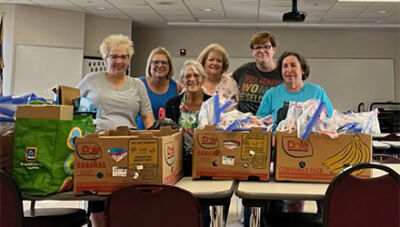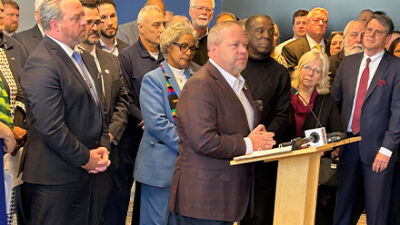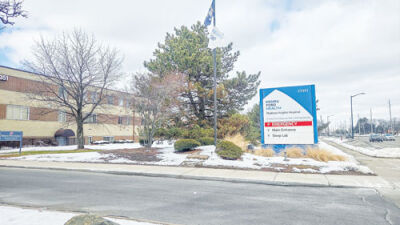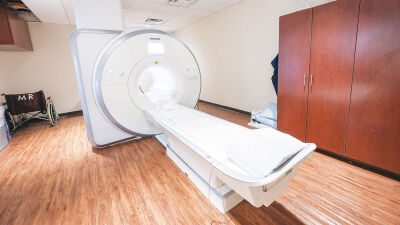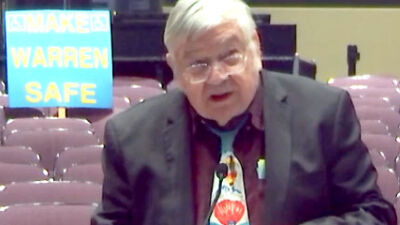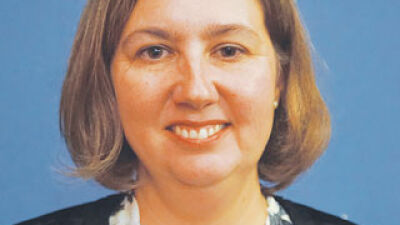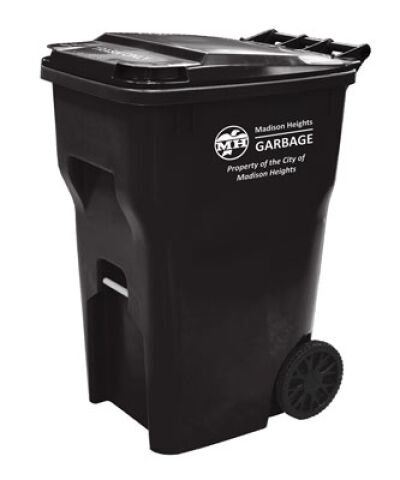
A mockup of the black 96-gallon trash cart that will be provided to Madison Heights residents free of charge later this summer. The cart will be required for trash pickup beginning in October, barring an exemption due to a disability.
Photo provided by Madison Heights
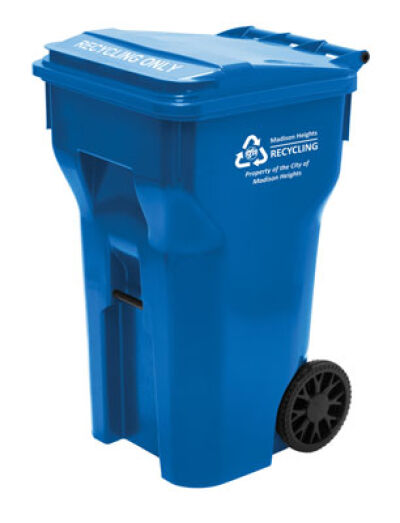
A blue 64-gallon recycling cart will also be provided, required for universal curbside recycling. Officials say the new carts are less likely to spill or attract rodents, and the city receives a discount from Priority Waste for using them since they’re easier for trucks to pick up.
Photo provided by Madison Heights
MADISON HEIGHTS — Having renewed its contract with waste hauler Priority Waste, the city of Madison Heights is preparing for a change in how trash and recyclables are collected.
By Sept. 1, the city expects to provide every resident with new standardized carts that will be used for trash disposal and universal curbside recycling. And beginning Oct. 6, the new carts will be required for pickup.
However, residents with disabilities may qualify for a door-side pickup service. To learn more about applying, call the Madison Heights Department of Public Services at (248) 589-2294.
Over the summer, all residents will receive one 96-gallon trash cart and one 64-gallon recycling cart, each with a Madison Heights logo. The carts will be provided free of charge, manufactured by Cascade Cart Solutions in Grand Rapids.
The city is switching to the carts-only model because the trucks used by Priority Waste have a system for collecting carts that reduces the need for manual lifting, increasing efficiency and staff safety.
In return, Madison Heights will receive a discount from Priority Waste, saving the city $200,000 annually, for total savings of $1 million over the course of the five-year contract.
“We’re committed to making this transition as smooth as possible,” said City Manager Melissa Marsh in a statement. “The new system reflects our values as a forward-thinking, environmentally conscious community.”
The new model is expected to improve recycling rates, reducing landfill waste. The carts are made with 10% post-consumer recyclable material. They feature lids to improve curbside appearance while reducing rodent activity.
The carts were purchased by the city in 2023 when the city was awarded grants from both The Recycling Partnership and the Michigan Department of Environment, Great Lakes and Energy. The city spent about $500,000 in matching grants to qualify.
Originally planned for rollout last summer, the program launch was delayed due to the acquisition of waste hauler GFL by Priority Waste.
Carts previously purchased from GFL or Priority Waste will still be accepted and can be used as secondary containers. The Department of Public Services will also collect and recycle any unused waste containers.
Refuse and recyclables must be in their respective carts for pickup. Overflow material can be handled through special pickups or by purchasing additional approved carts.
The city plans to provide more information in the weeks leading up to the program launch, communicating via direct mailers, on social media, through the city newsletter and local media.
A dedicated webpage is available at madison-heights.org/carts. The carts themselves will feature printed instructions upon delivery.
At the May 12 City Council meeting, approval was unanimous, 6-0. Absent that evening was Councilmember Emily Rohrbach.
Councilmember Quinn Wright said his feelings changed over time regarding the program.
“I will be honest with you, my initial feedback going into it was that we just keep everything the way it is,” Wright said. “I thought residents don’t like change, and that it would be a big deal … and a lot of confusion and frustration.
“However, after attending the discussions (with Priority Waste) and hearing from residents firsthand that the carts-only program was something they were open to, it became clear to me this would be our best option going forward,” he said.
Wright said he sometimes sees opossums and raccoons drawn to trash left out at night, and he worries about people’s pets getting into fights with them.
“You watch out for (your pets) because (the wildlife) is not always friendly to them,” Wright said, noting the closed carts will be less enticing to animals, and less likely to spill or have their contents blown by the wind.
He also suggested that seniors speak with their neighbors if they don’t create much trash and they’re concerned about moving the bulkier carts, asking if they can place their bag in the neighbor’s cart instead.
Mayor Pro Tem Mark Bliss was the sole council member who voted against the matching grants for the carts in 2023. He also had reservations about the new model, worrying that residents with disabilities would have to pay extra for a separate pickup service. But he was assured by staff that the city will cover the cost for qualifying residents.
As such, Bliss switched his vote to yes.
“I appreciate it’s a lower cost (for the carts-only contract) that will help us pay back the $500,000 that was invested in the carts,” Bliss said. “While not a true cost savings, it will help us pay back the investment made that way. And I appreciate all the comments around less rodents and errant trash.”
Councilmember Sean Fleming emphasized that it’s important for the city to accommodate those who struggle with the new carts.
“I just hope we’re being inclusive of all the people with disabilities, including the ones where you may not see a wheelchair or something like that,” Fleming said. “I also want to say that not everyone has some sort of ailment. Some people can push a cart at (age) 80, and others can’t.”
Councilmember William Mier said he encourages neighbors to look out for each other.
“I would like to issue a plea to our residents,” Mier said. “If you know a neighbor in your neighborhood who may not qualify (for the disabilities program) but who may struggle getting their cart out, please, just help them.”
 Publication select ▼
Publication select ▼
